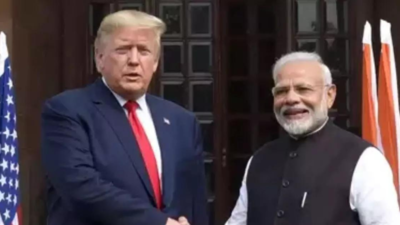- News
- Business News
- India Business News
- Dodging Trump tariff, seeking his tareef: India revs down Harley duty in new Budget
Trending
Dodging Trump tariff, seeking his tareef: India revs down Harley duty in new Budget
Ahead of PM Modi's US visit, India's budget lowered import duties on Harley-Davidson bikes, signaling improved trade relations. Meanwhile, President Trump plans to impose hefty tariffs on Mexico, Canada, and China to curb fentanyl flow and illegal immigration. His move might increase consumer costs and provoke retaliatory actions from these countries.
Ahead of PM Modi's visit to the US, the Budget seems to have paved the way for 'Harley diplomacy' with import duty on bikes slashed - a move that will benefit the iconic American motorcycle.
With President Trump threatening higher tariffs against countries, including India, the Centre signalled a change in headline duty for imported cars, such as Tesla, but the effective duty remains the same. That's because though the customs duty may have been lowered from 125 per cent to 70 per cent, there's a cess. It also means the cess revenue stays with the Centre, instead of the customs tariff being shared with states. The exercise extends to solar cells, yachts and other products. There's a third category - larger vehicles and vehicles to transport goods - where the effective rate will also come down. CBIC chairman S K Agarwal said the average import duty is down 105 basis points (100 basis points make a percentage point) to 10.6 per cent, while the cess gives govt the flexibility to lower the overall levy as and when required.
With the Centre facing attacks over its tariff policy, the change in the average duty will ease some pressure, though it's more of optics. The Centre has maintained its levies are in line with its international commitments.
Also read: Full Budget 2025
Customs duty for fully built 1,600cc bikes cut to 30 per cent
The Budget slashed customs duty not just for big motorcycles with engines above 1,600cc, but even in case of smaller ones, offering relief to those buying imported Honda, Suzuki, Ducati and KTMs. The fully built units will now face 40 per cent customs duty instead of 50 per cent earlier.
For 1,600cc motorcycles and above, customs duty was cut from 50 per cent to 30 per cent for fully built imported bikes and by five percentage points for those being shipped in semi-knocked-down kits (now 20 per cent), and completely knocked down (10 per cent).
Headline customs duty on imported cars costing upwards of $40,000 (around Rs 35 lakh) was cut from 125 per cent to 70 per cent. But with an agriculture cess of 40 per cent, instead of the earlier 10 per cent surcharge, the cumulative duty remains 110 per cent.
Also read: Union Budget 2025; Nine things consumers should know
Trump set to hit top trade partners with hefty tariffs
He set the Feb 1 deadline to push them to take strong action to halt the flow of fentanyl and precursor chemicals into the US from China via Mexico and Canada, as well as to stop illegal immigrants from crossing southern and northern US borders. But during a lengthy White House exchange with reporters, Trump brushed aside the notion that his tariff threats were merely bargaining tools. "No, it's not ... we have big (trade) deficits with, as you know, with all three of them." He also said that revenue was a factor and the tariffs may be increased, adding: "But it's a lot of money coming to the United States."
Also read: Bag of goodies for Delhi and Bihar during election season
Trump did, however, reference a potential carve out for oil from Canada, saying that tariff rate would be 10 per cent versus the 25 per cent planned for other Canadian imports. But he indicated wider tariffs on oil and natural gas would be coming in mid-Feb, remarks that sent oil prices higher. Crude oil is the top US import from Canada, reaching nearly $100 billion in 2023, according to US Census Bureau data.
Trump acknowledged that the steep duties could result in higher costs being passed on to consumers and that his actions may cause disruptions in the short term, but said he was not concerned about their impact on financial markets. Jake Colvin, president of the National Foreign Trade Council, which represents major US companies on trade matters, said imposing tariffs on key US trading partners "could impact the cost and availability of everything from avocados to air conditioners to cars and risks shifting the focus of our relationships away from constructive dialogue".
Although Trump speaks of "charging" other nations for tariffs, they are paid by importing companies and sometimes passed on to consumers. Automakers would be particularly hit hard by higher costs, through tariffs on vehicles assembled in Canada and Mexico. Their vast regional supply chain, where components can cross borders several times before final assembly, would further exacerbate these costs. And Trump said that more tariffs are coming, saying import taxes were being considered on European goods, as well as on steel, aluminum, copper, drugs and semiconductors.
Trump's move is expected to draw retaliatory tariffs, potentially disrupting more than $2.1 trillion in annual two-way US trade with its top three trading partners. Canada has drawn up detailed targets for immediate tariff retaliation, including duties on Florida orange juice. Canada has a broader list of targets that could reach $103 billion worth of US imports, but would hold public consultations before acting, a source said. Mexican President Claudia Sheinbaum has also threatened retaliation, but said she would "wait with a cool head" and was prepared to continue a border dialogue. China has been more circumspect about its retaliation plans, but has vowed to respond to defend its trade interests.
End of Article
FOLLOW US ON SOCIAL MEDIA
















